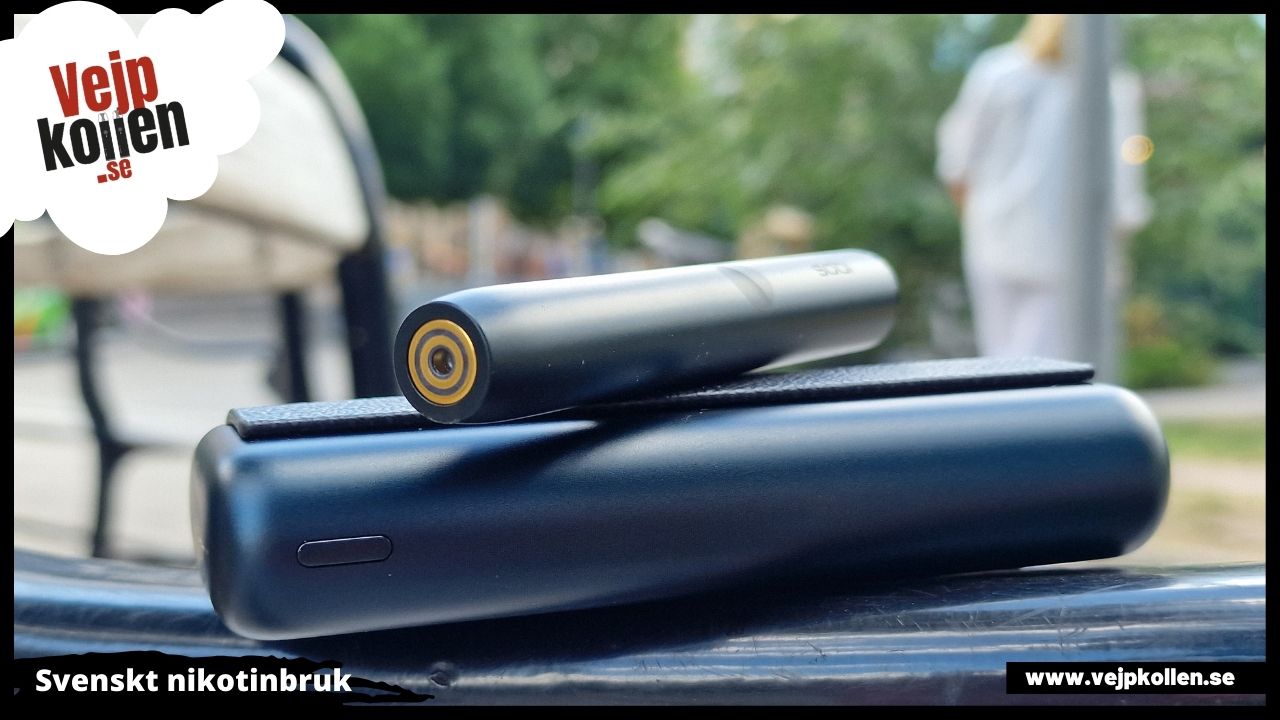For a long time, that cigarette with the wine on Friday night was part of life. But then, and only then. Maria is one of many Swedes who only use nicotine on festive occasions, a party smoker. And for a few years now she has been using a heat-not-burn system to get her kicks.
"The big difference is the smell. There is no smoke coming out and getting stuck in everything. If I think about it, that is probably the most important reason why I switched," she tells Vejpkollen.
- In the spring of 2023, Vejpkollen collaborated with Convenience Stores Sweden News to portray Swedish nicotine consumption, beyond the statistics. This is a report in a slightly modified version against the original published in CSS News. -
About 5 per cent of all Swedes do it. They have a cigarette with their beer or wine, at the weekend or whenever the mood strikes. Then it's done, and the packet remains in the drawer waiting for the next party. This is called 'occasional use' in the statistics. Party smoking in the vernacular. One of them is Maria, who has been a party smoker since she was eighteen. She grew up in the 1960s, she says. And smoking was not really a pleasant memory.
"I hated cigarettes as a child. Everyone smoked everywhere. My mum and dad too. I really hated the smell of smoke. It got into my clothes and never really went away," she says when we meet on a hot summer morning in the centre of Gothenburg.
"Most fun in the smokestacks"
Despite a strong aversion to the smell of smoke, she still tried smoking. It was in her late teens. And only at parties.
"There was some partying, and after all, it was a bit cool to smoke in those days. Then there was something about those who hung out in the smoking windows and under the fan at the parties. It was always the most fun to hang out there," she says when Vejppkollen meets her behind the Lorensberg Theatre in central Gothenburg.
Healthcare workers who use nicotine
She grew up in Graninge, a small community outside Sollefteå. She moved to Sundsvall to study and graduated as a nurse in the mid-1980s. Then it was off to the west coast and Gothenburg. Here she remained, in the health service, then with a major pharmaceutical company.
'I did my internship at Östra Hospital and started working there first. At that time there were a lot of nurses who smoked. Today no one smokes there anymore. But a lot of people use snus instead. It is mainly the new white snus that has gone down well with the nurses," she says.
Got dizzy from the snuff
For her, her interest in snus ended as quickly as it began, she says. She tried a loose snus in her teens, then never again.
"It was the worst thing I've ever experienced, I think. I accidentally swallowed some, got extremely dizzy and vomited. Never again. It's still in there, I can't even imagine a nicotine pouch. But my brother, on the other hand, who could never imagine smoking, was a long-time snus user. He only stopped when the children were small." she says.
A way to enjoy
Although she has been a regular smoker for almost 40 years, she has never considered herself a regular smoker. Or a nicotine addict, for that matter.
"No, I've stayed up many times, when I was expecting a baby, for example, and it's never been a problem. I just think it's really nice to have a smoke with a glass of wine in the evening sometimes. There aren't so many parties these days, and it's a way for me to enjoy myself."
Six years smoke-free
We talk about the fact that very few Swedes smoke today, and that other products are more and more visible, both on the streets and on the shelves in the shops. She smoked her last party cigarette almost 6 years ago. A relative asked her to try an IQOS instead.
"It was just when they arrived and I thought, why not? It couldn't be worse than a cigarette. I didn't really read up on it, I just tried it. And since then I haven't actually bought cigarettes." she says.
One way - with tobacco
IQOS, Philip Morris' tobacco heating system, was launched in 2015. The product has slowly become more and more popular, especially in Japan where IQOS accounts for 35 per cent of tobacco sales. Like a traditional e-cigarette, IQOS does not produce smoke, but a vapour. But unlike an e-cig, it is tobacco and not e-liquid that is heated. Instead, the tobacco is mixed with glycerine, the basis of all e-liquids, a liquid that easily vaporises at low temperatures and, together with the tobacco, forms a breathable aerosol.
Lower risk of injury
For a smoker, replacing cigarettes with an IQOS means that the amount of toxic substances inhaled is drastically reduced. According to UK Public Health Agencywhich regularly compiles research on harm minimisation products, the use of heat-not-burn products is likely to have a significantly lower risk of harm than smoking. At the same time, the risk of harm is considered to be slightly higher compared to regular e-cigarettes.
"Getting rid of the smell of smoke"
Now, it was not primarily harm minimisation that prompted Maria to switch to cigarettes. Rather, it was a more practical matter.
"The big difference is the smell. There is no smoke coming out that sticks to everything. Every night after a party you had to throw everything in the washing machine. The smell of smoke barely disappeared. That is no longer the case. I think that's the most important thing actually." she says to Vejpkollen.
Flavour ban underway
The actual tobacco stick used in an IQOS, until recently called 'heets' but now replaced by 'terea', can be bought with different flavours. These are mostly different flavours of tobacco, but also include menthol. Classic menthol cigarettes were banned a few years ago and it is likely that menthol will also disappear from IQOS. In the spring, the government began investigating how this should be done, in accordance with EU directives. But for Maria, the flavour itself is less important.
"If I did a blind test, I wouldn't notice the difference between the flavours. Menthol I probably would have noticed, but I've never used it. If IQOS goes away for some reason, I will probably stop flaring altogether. I know I will never smoke again, and regular e-cigarettes have never appealed to me." she says.
"Many people opt out of cigarettes"
Before we part ways, we get stuck on the topic of harm reduction - the idea that smokers can quit smoking without quitting nicotine for that matter - and thus reduce the risks of nicotine use. Although she does not consider herself a nicotine addict, she is in favour of this development.
"Yes, it's actually a good thing. I don't think people will stop using nicotine, or that cigarettes will disappear completely from the shelves either. But I have seen through my work that a lot of people choose not to use cigarettes today. Especially women who work in healthcare. It's a marked difference from how it was in the past, when the smoking rooms were filled during breaks."
Sensitive issue for pharmaceutical companies
But it is a sensitive subject, we realise. Especially in the sector she works in, the pharmaceutical industry. After all, the market for nicotine products is competitive and hotly debated. And when it comes to smoking cessation, pharmaceutical companies have a very different philosophy from, for example, road hauliers and tobacco companies. Harm minimisation (as opposed to medicalised smoking cessation) is a word that evokes bad blood and the idea of the pharmaceutical industry launching a vaping or similar tool is very unlikely, she believes.
'Companies in the pharmaceutical world could never launch a product that carries a risk of adversely affecting the lungs. Even if the risk is small. That's just the way it is," says Maria as we part ways on this summer day in Gothenburg.
"Many don't want to quit - even though they should"
She prefers not to be pictured or seen as a kind of 'ambassador' for nicotine use, even if it is smoke-free. At work, in the pharmaceutical sector, there is zero tolerance for nicotine during working hours. And she respects that.
"I don't have to bring my device to work, and I didn't smoke during working hours before. I also don't nag the few friends who still smoke to give up cigarettes. There aren't many people who smoke anymore, but some don't want to quit, even though they should. For me, I'm done smoking, but that doesn't mean everyone can take that step as easily. I think it's important to realise that."




